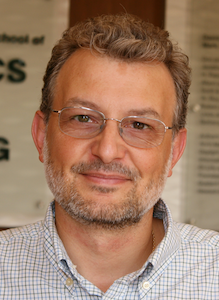
I am the Luddy Distinguished Professor of Informatics and Computer Science at the Indiana University Luddy School of Informatics, Computing, and Engineering, director of the Observatory on Social Media, and a member (and former director) of the Center for Complex Networks and Systems Research. I also have courtesy appointments in Cognitive Science and Physics and am a Fellow of the Center for Computer-Mediated Communication, a Senior Research Fellow of the Kinsey Institute, a Fellow at the ISI Foundation in Torino, Italy, and a Fellow of the ACM and AAAS.
Research in my group, NaN, spans computational social science, network science, Web science, and data science, with a focus on analyzing and modeling the spread of information and misinformation in social networks and detecting and countering the manipulation of social media. We also study social computing, Web search and data mining, and science of science.
My calendar and mailbox are crowded. The most efficient way to schedule an appointment with me is to contact Tara Holbrook. For any matters related to the Observatory on Social Media, please use this contact form. Or as a last resort you can try your luck by email, phone (+1-812-856-1377), or in person (LU 2028).
I am no longer taking on new PhD students. If you send me an inquiry about joining the lab, you will likely receive an automated reply with the same information.
Recent News
Menczer AAAS Fellow
The American Association for the Advancement of Science, one of the world’s largest general scientific societies and publisher of the Science family of journals, named Filippo Menczer to its 2024 fellows’ class, a lifetime honor within the scientific community. Menczer is among 471 scientists, engineers and innovators who have been elected for their scientifically and socially distinguished achiev…
OSoMe and CNetS researchers to present 26 papers at summer conferences
We’re excited to announce that researchers at the Observatory on Social Media and the Center for Complex Networks and Systems Research will present 26 papers at various conferences over the summer. Annual Conference of the North American Chapter of the Association for Computational Linguistics (NAACL) Zoher Kachwala, Jisun An, Haewoon Kwak, Filippo Menczer: REMATCH: Robust and effici…
Anatomy of an AI-powered malicious social botnet
A preprint of the paper titled “Anatomy of an AI-powered malicious social botnet” by Yang and Menczer was posted on arXiv. Concerns have been raised that large language models (LLMs) could be utilized to produce fake content with a deceptive intention, although evidence thus far remains anecdotal. This paper presents a case study about a coordinated inauthentic network of over a thousand fa…
OSoMe, IUNI, and CNetS to present 57 papers at upcoming conferences
We’re excited to announce that researchers at the Observatory on Social Media, the IU Network Science Institute, and the Center for Complex Networks and Systems Research will present 57 papers at various conferences over the summer. Network Science Conference (NetSci) Oral presentations Sadamori Kojaku, Clara Boothby, Filipi Silva, Attila Varga, Xiaoran Yan, Stasa Milojevic…
New network visualization tool maps information spread
Today the Observatory on Social Media and CNetS launched a revamped research tool to give journalists, other researchers, and the public a broad view of what's happening on social media. The tool helps overcome some of the biggest challenges of interpreting information flow online, which is often difficult to understand because it's so fast-paced and experienced from the perspective of an i…
We're moving and hiring!
We have two big announcements! First, CNetS (along with IUNI and OSoMe) is moving to the new Luddy Center for Artificial Intelligence. Second, we have a new tenure-track assistant professor position in Artificial Intelligence and Network Science. We welcome any candidates who study AI, complex systems, and network science (all broadly defined). Potential research areas include, but are not …
Probing political bias on Twitter with drifter bots
Our latest paper "Neutral bots probe political bias on social media" by Wen Chen, Diogo Pacheco, Kai-Cheng Yang & Fil Menczer just came out in Nature Communications. We find strong evidence of political bias on Twitter, but not as many think: (1) it is conservative rather than liberal bias, and (2) it results from user interactions (and abuse) rather than platform algorithms. We tracked…
ICWSM Test of Time Award
Our 2011 paper Political Polarization on Twitter was recognized at the 2021 AAAI International Conference on Web and Social Media (ICWSM) with the Test of Time Award. First author Mike Conover, who was then a PhD student and is now Director of Machine Learning Engineering at Workday, accepted the award at a ceremony at the end of the ICWSM conference. Other authors are Jacob Ratkiewicz (now a Tec…
Distinguished Master’s Thesis Award
CNetS alumnus Mihai Avram is the recipient of the 2020 Indiana University Distinguished Master’s Thesis Award for his work on Hoaxy and Fakey: Tools to Analyze and Mitigate the Spread of Misinformation in Social Media. This award recognizes a "truly outstanding" Master's thesis based on criteria such as originality, documentation, significance, accuracy, organization, and style. Some of the findin…